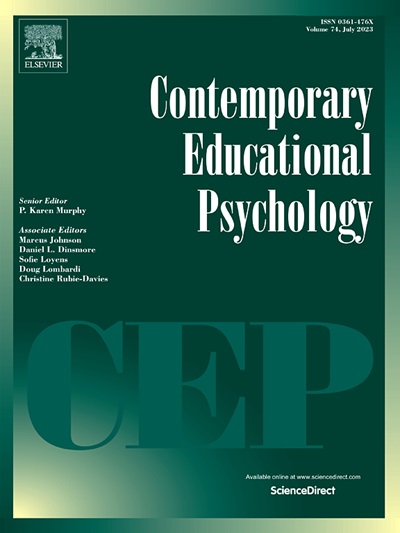时间和行凶者的身份在处理基于学校的不利种族化经历时很重要
IF 3.8
1区 心理学
Q1 PSYCHOLOGY, EDUCATIONAL
引用次数: 0
摘要
在美国教育体系中,被认为肤色较深、被认定为黑人/非裔美国人或在民族和种族上被边缘化的年轻人更有可能遭遇各种基于学校的不利种族化经历(AREs)。族裔和种族边缘化的年轻人在决定如何应对艾滋病时,可能需要评估和获取各种社会文化线索和因素。这些特定的社会文化因素可能与性行为的发展时间(例如,小学与高中)和犯罪者的社会身份(例如,老师与同伴)有关。其他因素,如学生的社会身份(即性别、种族和民族)和学校的种族和民族组成,在年轻人评估一个ARE和做出应对决定时可能会考虑。本研究利用文化生态发展理论探讨了社会文化因素在207名成年人(大多数年龄在17至59岁之间,自认为是黑人/非裔美国人)应对学校性暴力行为决策中的独立和中介作用。结果显示,发生恐惧的时间和犯罪者身份与接受、愤怒和拒绝作为应对策略的使用增加有关,没有发现间接影响。影响讨论了如何为教育工作者和家长提供必要的信息,以支持在学校中被民族和种族边缘化的年轻人的福祉和坚持。本文章由计算机程序翻译,如有差异,请以英文原文为准。
Timing and perpetrator identity matter when coping with school-based adverse racialized experiences
Young people perceived as darker-skinned, identified as Black/African American, or ethnically and racially marginalized will have an increased likelihood of encountering various school-based adverse racialized experiences (AREs) in the U.S. education system. Ethnically and racially marginalized young people may need to appraise and access a variety of sociocultural cues and factors when making decisions about how to cope with AREs. These specific sociocultural factors may be associated with the developmental timing of AREs (e.g., elementary vs. high school) and the social identity of the perpetrator (e.g., a teacher vs. a peer). Other factors, such as the student’s social identity (i.e. gender, race, and ethnicity) and the racial and ethnic composition of the school, may be considered when a young person appraises an ARE and makes coping decisions. This study uses cultural-ecological developmental theories to explore the independent and mediated contributions of sociocultural factors in retrospective accounts of coping decisions about school-based AREs in a sample of 207 adults, most of whom self-identified as Black/African American between the ages of 17 and 59. Results showed the timing of AREs and perpetrator identity were associated with increased use of acceptance, anger, and denial as coping strategies, with no indirect effects found. Implications discuss ways to equip educators and parents with the information needed to support the well-being and persistence of ethnically and racially marginalized young people in schools.
求助全文
通过发布文献求助,成功后即可免费获取论文全文。
去求助
来源期刊

Contemporary Educational Psychology
PSYCHOLOGY, EDUCATIONAL-
CiteScore
16.50
自引率
3.90%
发文量
74
期刊介绍:
Contemporary Educational Psychology is a scholarly journal that publishes empirical research from various parts of the world. The research aims to substantially advance, extend, or re-envision the ongoing discourse in educational psychology research and practice. To be considered for publication, manuscripts must be well-grounded in a comprehensive theoretical and empirical framework. This framework should raise critical and timely questions that educational psychology currently faces. Additionally, the questions asked should be closely related to the chosen methodological approach, and the authors should provide actionable implications for education research and practice. The journal seeks to publish manuscripts that offer cutting-edge theoretical and methodological perspectives on critical and timely education questions.
The journal is abstracted and indexed in various databases, including Contents Pages in Education, Australian Educational Index, Current Contents, EBSCOhost, Education Index, ERA, PsycINFO, Sociology of Education Abstracts, PubMed/Medline, BIOSIS Previews, and others.
 求助内容:
求助内容: 应助结果提醒方式:
应助结果提醒方式:


